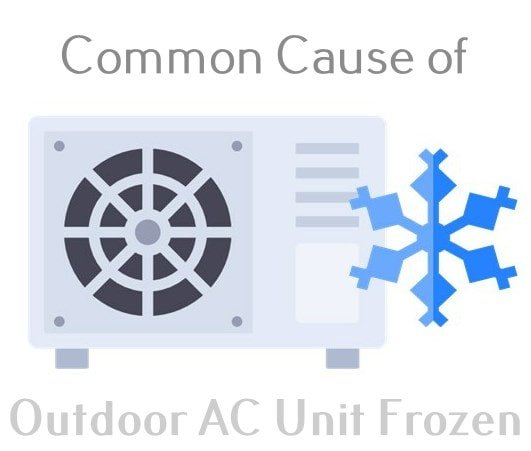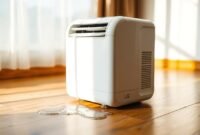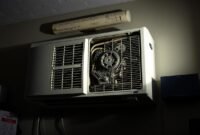Is your outside air conditioner unit frozen solid? This problem can ruin your summer cooling plans. A frozen AC is not just a hassle—it’s a sign of possible damage that could make you sweat.
When your AC can’t cool your home, something’s amiss. Dirty filters, refrigerant problems, and blocked airflow can turn your AC into an ice block. I’ll show you the top three reasons for this and why it’s more than just a curiosity.

Understanding Your Air Conditioning System Basics
As an HVAC technician, I’ve seen many homeowners confused by their cooling systems. Let me explain how air conditioners work to cool your home.
Your air conditioning system is like a heat-removing superhero. It doesn’t make cool air. Instead, it takes heat from your indoor space and moves it outside through a clever refrigeration cycle.
The Cooling Cycle Explained
An AC system works through a complex closed-loop process. It involves key components:
- Evaporator coil (indoor unit)
- Compressor
- Condenser (outdoor unit)
- Expansion valve
Here’s how the refrigerant moves through the system to cool your home:
| Stage | Process | Temperature Change |
|---|---|---|
| 1. Evaporation | Absorbs indoor heat | Cools indoor air |
| 2. Compression | Increases refrigerant pressure | Raises temperature |
| 3. Condensation | Releases heat outside | Cools refrigerant |
| 4. Expansion | Reduces refrigerant pressure | Prepares for next cycle |
By understanding these basics, you’ll see how your AC works hard to keep your home cool on hot days.
Signs of a Frozen Air Conditioner Unit
Finding out if your outside air conditioner unit is frozen can be hard. But, there are clear signs to look for. A frozen AC can make your home feel hot, not cool.
- Warm Air Circulation: If your AC blows warm air, it’s a sign of a problem.
- Visible Ice Formation: Frost or ice on the refrigerant lines or the unit itself.
- Reduced Airflow: If the cool air from your vents is weak or little.
- Water Leakage: Too much water or condensation around the unit.
Knowing these signs can help you fix problems early. A frozen AC unit is not just a hassle. It can also damage your system if not fixed.
| Sign | Potential Indication |
|---|---|
| Warm Air Blowing | Possible Refrigerant Issue or Frozen Coils |
| Ice on Refrigerant Lines | Critical Freezing of AC System |
| Water Pooling | Blocked Drainage or Severe Condensation |
If you see any of these signs, act fast. Your AC is trying to tell you something is wrong. Fixing it early can save you from expensive repairs later.
Why Outside Air Conditioner Unit Frozen Is a Serious Problem
A frozen outside air conditioner unit is a big problem for your home’s cooling. Ice on your AC is not just a small issue. It’s a major problem that makes cooling your home hard.
Having a frozen air conditioning system is more than just uncomfortable. It makes your AC work much harder. This can lead to many problems:
- Reduced cooling capacity
- Increased energy consumption
- Potential permanent system damage
- Higher electricity bills
Energy Efficiency Takes a Nosedive
When your outside air conditioner unit is frozen, it can’t cool your home well. This makes it work harder and use more electricity. I’ve seen energy bills go up by 50% when an AC unit isn’t working right.
Read also: Air Conditioner Outside Unit Not Running
This strain can cause your cooling system to fail if not fixed. The compressor, the AC’s heart, can get damaged from freezing and working too hard.
Think of a frozen AC like a car engine with ice in its radiator. It can’t work well. It’s important to catch these problems early and know the signs of freezing.
The Connection Between Airflow and AC Freezing

Keeping your home cool depends on airflow. Your air conditioning needs air to move freely to work right. A dirty air filter can stop your AC from working well.
Air circulation is like your AC’s breathing. If air can’t move, your AC can freeze. Here’s why:
- Blocked air paths reduce system efficiency
- Restricted airflow causes temperature imbalances
- Insufficient air movement leads to coil freezing
Many homeowners face AC freezing because they ignore their air filters. A dirty filter makes your AC work too hard. This can cause the evaporator coil to freeze.
| Airflow Issue | Potential Consequence |
|---|---|
| Dirty Air Filter | Reduced Cooling Efficiency |
| Blocked Vents | Uneven Temperature Distribution |
| Restricted Circulation | Potential System Freeze |
Regular maintenance is essential. Check and replace your air filters every month. This simple action can prevent many cooling issues. It also saves you from expensive repairs and keeps your AC running well all summer.
Dirty Air Filters: The Primary Culprit
Your air conditioning system’s performance depends on a simple yet key part: the air filter. A dirty air filter can harm your HVAC system. It causes problems that go beyond just dust.
A clogged air filter becomes a big problem for your cooling system. My experience as an HVAC technician shows how bad a neglected filter can be.
Understanding Filter Replacement Cycles
Not all air filters last the same. How often you need to replace them depends on:
- Home environment complexity
- Number of occupants
- Pet presence
- Local air quality
Here are some general tips for changing your air filter:
| Household Type | Recommended Filter Change |
|---|---|
| Single person, no pets | Every 90 days |
| Family with pets | Every 30-60 days |
| Homes with allergies | Every 20-45 days |
Changing your air filter regularly is more than just maintenance. It’s about keeping your HVAC system efficient. It also helps lower energy costs and ensures clean air inside your home. A clean filter means a happy, healthy cooling system.
Refrigerant Leaks and System Performance
I’ve seen many air conditioning systems struggle due to refrigerant leaks. These leaks can really hurt your cooling and cause big problems. A low refrigerant level always means there’s a leak somewhere.
When refrigerant levels go down, your HVAC tech knows what to do. They look for signs like:
- Hissing or bubbling sounds near the AC unit
- Oily residue around refrigerant lines
- Dramatically reduced cooling efficiency
- Ice formation on refrigerant lines
Catching these problems early can save you a lot of money. A pro HVAC technician can find and fix leaks fast. This lets you get your system working right again.
| Leak Severity | Potential System Impact | Recommended Action |
|---|---|---|
| Minor Leak | Reduced Cooling Efficiency | Schedule Inspection |
| Moderate Leak | Inconsistent Cooling | Immediate Repair |
| Major Leak | Complete System Failure | Urgent Replacement |
Remember, refrigerant leaks are a big deal. Don’t try to fix them yourself. Always let a skilled HVAC technician handle the job.
The Role of Evaporator Coil in AC Freezing
The evaporator coil is key in cooling your home. It absorbs heat from indoor air. But, it can cause problems if not taken care of.
A dirty evaporator coil is a big problem for your AC. Dust and dirt make it hard for the coil to transfer heat. This can lead to serious issues with your AC’s performance.
Key Problems with Evaporator Coils
- Reduced heat absorption capacity
- Increased energy consumption
- Potential system freezing
- Decreased overall cooling efficiency
Regular maintenance is key to avoid these problems. I suggest getting a professional to clean your evaporator coil. Dust and dirt can block heat transfer, making cooling harder.
When the coil gets too dirty, your AC works harder. This can cause freezing, lower performance, and higher energy bills.
Prevention Strategies
- Schedule annual professional HVAC maintenance
- Replace air filters regularly
- Keep surrounding areas clean and dust-free
- Monitor system performance
Understanding the evaporator coil’s role helps you keep your AC running well. This prevents freezing and keeps your home cool.
Professional HVAC Maintenance Benefits
As an experienced homeowner, I’ve learned that preventive care is key for my air conditioning system. Calling in a professional HVAC technician is not just a luxury. It’s a smart investment in your home’s comfort and efficiency.
When an HVAC technician inspects your system, they do more than just a quick look. They can spot issues before they turn into costly repairs. They pay special attention to the dirty evaporator coil, which can greatly affect your AC’s performance.
- Comprehensive system diagnostics
- Deep cleaning of critical components
- Refrigerant level verification
- Electrical connection inspections
- Efficiency performance testing
Regular maintenance brings many benefits. By fixing a dirty evaporator coil early, you avoid reduced cooling and system breakdowns. An HVAC technician can clean hard-to-reach areas, making sure your system works well and lasts longer.
Think of professional maintenance as a health checkup for your air conditioning system. Just as you visit a doctor for preventive care, your AC needs professional attention to stay in top shape. The small investment in maintenance can save you a lot of money on future major repairs.
DIY Troubleshooting Steps for Frozen AC Units
Discovering your air conditioning unit has frozen can be frustrating, but don’t worry. I’ll guide you through safe DIY steps to fix the issue. This will get your system cooling efficiently again.
Read also: How to Reset Frigidaire Air Conditioner
When you notice your AC unit is frozen, the first critical step is to stop the freezing process. Here’s a step-by-step guide to help you through the thawing process:
- Turn off the cooling system at the thermostat immediately
- Switch the fan setting to “on” instead of “auto”
- Allow warm air to circulate and begin the thawing process
Safe Thawing Techniques
Patience is key when thawing your AC unit. Avoid using hairdryers or other direct heat sources, as these can damage delicate components. The safest method is to blow warm air through the system naturally. The thawing process can take several hours, so plan ahead.
- Keep the system off during thawing
- Check and replace air filters if dirty
- Monitor the unit for complete defrosting
After the unit has completely thawed, carefully restart the system. If it freezes again or blows warm air, it’s time to call a professional HVAC technician for a thorough inspection.
Preventing Future AC Freeze-Ups

Keeping your air conditioning system in good shape is key to keeping your home cool. I’ve found that stopping AC freeze-ups starts with being proactive. A dirty air filter can quickly become a big problem, so I’ll share some important tips to keep your system running smoothly.
Here are the best ways to prevent AC freeze-ups:
- Regular Air Filter Maintenance
- Change filters every 1-3 months
- Check for dust and debris buildup
- Use high-quality air filters recommended for your system
- Airflow Management
- Keep all vents clear and unobstructed
- Ensure furniture doesn’t block air circulation
- Check return air vents regularly
- Professional HVAC Care
- Schedule annual professional inspections
- Get system tune-ups before peak cooling season
- Address any issues early
Watching how your system works is important to avoid freezing. I suggest setting reminders for when to change filters and keep an eye on how well your AC is cooling. A well-kept system not only cools your home better but also makes your air conditioner last longer.
By following these steps, you’ll greatly lower the chance of AC freeze-ups. This will keep your home cool and comfortable even when it’s hottest. Remember, a bit of upkeep can save you a lot of trouble and keep your cooling system working well.
Common Mistakes That Lead to AC Freezing
Some mistakes can turn your air conditioning into a problem. Knowing these errors can stop your outside unit from freezing and blowing warm air.
Many homeowners accidentally harm their AC systems. Let’s look at the main mistakes that can freeze your outside unit.
- Running the AC in Low Temperatures
Using your AC when it’s too cold can damage it. Most ACs work best above 60°F. Running it in colder weather makes it work too hard, which can freeze it.
- Incorrect Thermostat Settings
Setting your thermostat too low doesn’t cool your home faster. It makes the system run all the time, which can freeze the outside unit and blow warm air.
- Neglecting Regular Maintenance
Not getting your HVAC checked every year is like not changing your car’s oil. Dust and debris can make your system less efficient and freeze it.
To avoid these mistakes, you need to be aware and take care of your AC. Regular maintenance, the right temperature, and knowing your AC’s limits can prevent expensive fixes and keep your home cool.
| Mistake | Potential Consequence | Prevention Tip |
|---|---|---|
| Low Temperature Operation | Outside unit freezing | Avoid running AC below 60°F |
| Extreme Thermostat Settings | Continuous system strain | Maintain moderate temperature settings |
| Lack of Maintenance | System inefficiency | Schedule annual professional inspections |
Knowing these common mistakes can help keep your AC system working well all season.
Conclusion
Dealing with a frozen outside air conditioner unit can be really frustrating. I’ve shared insights into AC systems and the importance of understanding freezing issues. It’s always better to prevent problems than to fix them later.
Regular check-ups and watching for signs of trouble are key. If you notice something’s off, call a skilled HVAC technician right away. They can fix small problems before they get big.
Keeping your AC system in good shape is essential. Regular maintenance, checking airflow, and fixing issues fast will keep your AC working well. A well-maintained AC system keeps your home cool and saves you money.
Knowing a bit about your AC system and taking preventive steps can help a lot. Stay cool, stay informed, and call a pro when you need to.


